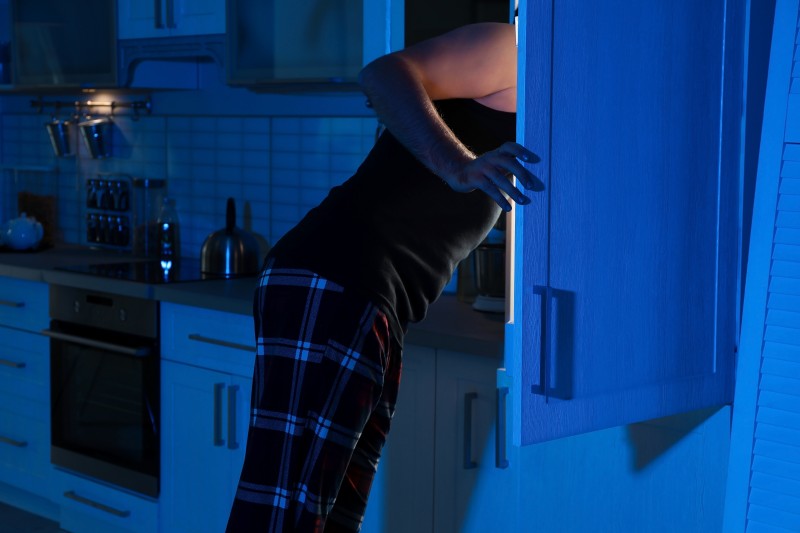
With so much conflicting health and fitness information, it’s no wonder why everyone’s confused. The issue of late-night eating seems to be one of the most recent topics of debate. But what do the facts tell us, and will eating late at night make us gain weight?
A calorie at 7:59 p.m. is the same as a calorie at 8:01 p.m., and contrary to what some believe, there’s no magical time where every calorie suddenly gets stored as fat. Saying that a calorie at 8:01 p.m. will make you gain fat is kind of like saying that eating fat will make you gain fat, or more recently, “carbs will make you fat.” These are blanket statements that just aren’t true.
Eating of fats, carbohydrates, and even protein will cause you to gain weight if you overeat them. If you take in more energy than what your body needs, it will store it for later use. This might be of benefit to you if you’re a hunter-gatherer and don’t know where your next meal’s coming from, but most of the time you do know where it’s coming from.
Now, eating at say, 8:01 p.m., is the same. It will make you gain weight if you’re eating more than your body needs. It will also cleverly store the excess energy for later use, in the meantime giving your six-pack the look of a beer keg. But whether you’re eating at 7:59 p.m., 8:01 p.m., or in the middle of the night, it really doesn’t matter. Consider each of the 24 hours in a day to be important as each other.
In some parts of the Mediterranean, it’s not uncommon for people to be eating their main meal at 10 p.m. Of note they also eat a lot of starchy carbohydrates and a variety of fat sources. Many of these countries don’t have an obesity problem.

Eric Reisenberger © 123rf.com
The Hadza of Tanzania are some of the world’s last full-time hunter-gatherers. Unchanged for over 10,000 years, they live off what they find: wild game, honey, and plants, and they don’t care what time they eat it.
You might also want to consider closer to home that our grandparents and great-grandparents weren’t worrying about what time they were eating their main meal, either, and did they have a body fat problem? Most likely not.
In a 2016 study that looked at 1,620 four- to eighteen-year-olds in the UK, it was found there was no evidence eating after 8 p.m. was associated with excess weight gain. There was also no evidence that later eaters consumed more calories, either. Calorie and nutrient intake were shown to be similar; therefore, the results were similar.
A 2016 review of research concluded that regular eating habits are the key to regulating body weight, while unplanned snacking, particularly in the evenings, seems to be associated with higher body weight. While it’s very easy to look at this and think that it shows late-night eating is bad, what it really demonstrates is something you already know. By eating EXTRA unplanned calories in the evening, you’re more likely to gain weight. Your irregular eating habits are also more likely to result in you eating extra calories, particularly in the evening, and therefore, are more likely to be stored as body fat.
A 2011 study in the Journal of Obesity showed something quite interesting. The sleeping and eating patterns of 52 people were followed over seven days. It was found that those who went to bed later in the evening generally consumed more calories in the evening than those who went to bed early. That’s obvious. If we’re awake longer, we’re probably going to eat more. But what’s also interesting is they found that eating after 8 p.m., whether you’re a late sleeper or not, was associated with a higher body mass index. This suggests that late-night snacking could be harmful to your waistline and your abs!
It shouldn’t come as a big surprise when we say that giant man-bowl of breakfast cereal at 9 p.m. isn’t doing us any favors.
In a study, Baron et al. found that total proteins, fats, and carbohydrates eaten after 8 p.m. were associated with higher body fat. That’s to say that rather than carbohydrates alone, excessive consumption of all nutrients was associated with fat gain. Evening and late-night snacking were associated with weight gain not because of the type of food but because of the total amount of food and calories consumed after 8 p.m.
For those of us who choose to have a late evening slow-release protein snack, such as cottage cheese, is this actually doing our waistlines more harm than good? This might help the muscle building process, but it should be factored in when trying to optimize fat loss.
Researchers have found that those who tend to eat late are less likely to be successful when trying to lose weight. They recommend that when trying to lose body fat, we should pay special attention to both total calories throughout the day and our eating patterns.
Eating at consistent meal times is of importance to those of us looking to achieve our body and strength goals. Inconsistent eating has been shown to disrupt normal body enzyme function and hormonal balance, potentially leading to excessive fat gain.

belchonock © 123rf.com
Because we’ve heard so many times that late-night eating is a problem, including some of the mentioned studies, most of us believe it. But it’s the habit of eating energy your body doesn’t need, often because of evening boredom that’s the real problem. The excess calories are the problem — no matter what type or time they’ve been eaten.
Yes, late-night snacking can be problematic and can even cause weight gain. But it’s only causing weight gain because you’ve already met your calorie needs for the day and have only now started over-consuming. It’s the most dangerous time of the day because your gas tank is already full, you’re not burning much of it, and now it’s over-spilling.
Your body is very clever and likes to get into a normal eating routine, so it can anticipate food and get ready for it. It’s so clever that even the sight or smell of food can evoke an insulin response, ready to shuttle some energy into cells around the body. Fat cells or muscle cells, that’s up to you.
A calorie is just a calorie at the end of the day, no matter what time it’s eaten. 7:59 p.m. or 8:01 p.m. — that’s your choice.
Useful Tips
A calorie is a measurement of energy, and it’s too much energy that gets stored as body fat. Some calories are better than others, but you need to manage your energy intake no matter what time of day it is.
If you know you’re likely to raid the cupboards in the late evening, then think about saving some calories earlier in the day. Make sure it fits into your daily energy needs.
For those that suggest restricting carbohydrates in the evening to be a good fat loss hack, it’s not. It’s merely a way to restrict total carbohydrates and calories throughout the day. If this works for you, however, then go for it. Carbohydrates have a positive effect on melatonin production and hence sleep quality, so it may be argued that carbohydrates in your evening meal could be beneficial.
As a rule, if you are late-night snacking, then try to cap your calories at no more than say, 200 to 300 calories. Setting a limit will give you permission to use them without the guilt while minimizing the chances of over spilling on calories.
Most importantly, be consistent with your eating habits. Your body likes to be in the know!
Gareth Sapstead, MSc CSCS, also known as The Fitness Maverick, is a renowned trainer and men’s fitness expert. He’s the author of several books, The Fitness Maverick Podcast on iTunes, and a contributor for such online publications as Consumer Health Digest, Muscle & Strength, and Breaking Muscle, among others. Join him on LinkedIn, Facebook, or Instagram.
Header image courtesy of Andrey Armyagov © 123rf.com











When calories are equated, time restricted feeding might be of use for some things however, but very little evidence to date.
This is probably the worst comparison I've ever seen. This article is also really poorly written with a TON of contradictory statements.
"In a 2016 study that looked at 1,620 four- to eighteen-year-olds in the UK, it was found there was no evidence eating after 8 p.m. was associated with excess weight gain. There was also no evidence that later eaters consumed more calories, either. Calorie and nutrient intake were shown to be similar; therefore, the results were similar."
"A 2011 study in the Journal of Obesity showed something quite interesting. The sleeping and eating patterns of 52 people were followed over seven days. It was found that those who went to bed later in the evening generally consumed more calories in the evening than those who went to bed early. That’s obvious. If we’re awake longer, we’re probably going to eat more. But what’s also interesting is they found that eating after 8 p.m., whether you’re a late sleeper or not, was associated with a higher body mass index. This suggests that late-night snacking could be harmful to your waistline and your abs!"
You use these two studies to make your argument... but they literally are stating the complete opposite conclusion!? So which is it? eating late is bad for your waistline, or isn't it? This is a poorly written article